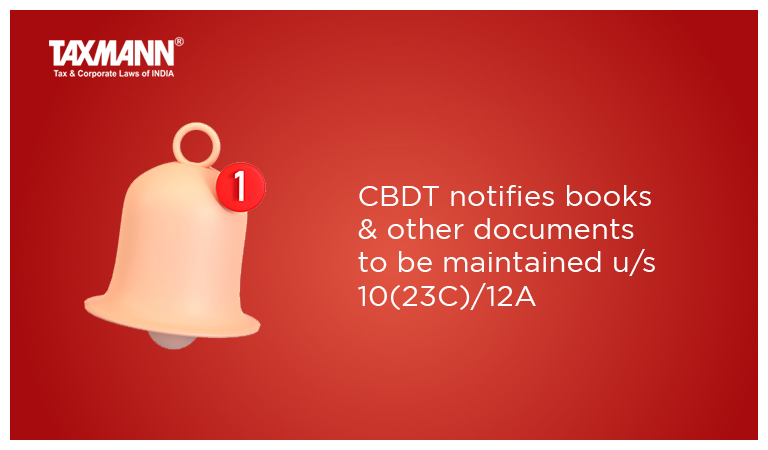CBDT notifies books & other documents to be maintained u/s 10(23C)/12A
- Blog|News|Income Tax|
- 2 Min Read
- By Taxmann
- |
- Last Updated on 16 August, 2022

Notification No. 94/2022, dated 10-08-2022
Under the Income-tax Act, ordinary taxpayers are required to maintain books of accounts and get them audited. The requirement to maintain the books of account is prescribed under Section 44AA. However, there is no specific provision under the Act providing for the books of accounts to be maintained by trusts or institutions.
The Finance Act 2022 amended Section 12A and Section 10(23C) to provide that where the total income of the trust or institution under both regimes, without giving effect to an exemption under Section 10(23C) or section 11 and 12, exceeds the maximum amount which is not chargeable to tax, such trust or institution shall keep and maintain books of account and other documents in such form and manner and at such place, as may be prescribed.
The Central Board of Direct Taxes (CBDT) has notified a Rule 17AA prescribing books and other documents to be kept and maintained by trust or institution registered under section 12A/10(23C). The key extracts of the newly notified Rule 17AA are given in the below paragraphs.
1) Every fund or institution or trust or any university or other educational institution or any hospital or other medical institution is required to keep and maintain the following books of account and other documents:
a. Books of account, including the following:
-
-
-
- Cash Book;
- Ledger;
- Journal;
- Copies of bills;
- Original bills;
- Any other book that may be required to be maintained to give a true and fair view.
-
-
b. Books of account for business undertaking and business carried on by assessee other than business undertaking referred to in section 11(4).
c. Other documents for maintaining:
-
-
-
- Record of all projects and institutions run by the person containing details of their name, address, and objectives;
- Record of income in respect of voluntary contribution containing details of donor, income from property held under trust along with list of such property, and other income of fund or institution or trust, etc.;
- Record in respect of the application of income in India & outside India, deemed application of income, income accumulated or set apart, money invested in the specified mode, etc.;
- Record of voluntary contribution received & its application;
- Records of loans and borrowings;
- Record of properties held by trust;
- Record of the specified person.
-
-
2) The books of account and other documents may be kept in written form or in electronic form or in digital form or as printouts of data stored digitally.
3) The books of account and other documents shall be kept and maintained by the entities at their registered office. However, books may be kept in another place if management decided to do so by passing a resolution.
4) The books of account and other documents shall be kept and maintained for a period of 10 years from the end of the relevant assessment year.
Click Here To Read The Full Notification
Disclaimer: The content/information published on the website is only for general information of the user and shall not be construed as legal advice. While the Taxmann has exercised reasonable efforts to ensure the veracity of information/content published, Taxmann shall be under no liability in any manner whatsoever for incorrect information, if any.

Taxmann Publications has a dedicated in-house Research & Editorial Team. This team consists of a team of Chartered Accountants, Company Secretaries, and Lawyers. This team works under the guidance and supervision of editor-in-chief Mr Rakesh Bhargava.
The Research and Editorial Team is responsible for developing reliable and accurate content for the readers. The team follows the six-sigma approach to achieve the benchmark of zero error in its publications and research platforms. The team ensures that the following publication guidelines are thoroughly followed while developing the content:
- The statutory material is obtained only from the authorized and reliable sources
- All the latest developments in the judicial and legislative fields are covered
- Prepare the analytical write-ups on current, controversial, and important issues to help the readers to understand the concept and its implications
- Every content published by Taxmann is complete, accurate and lucid
- All evidence-based statements are supported with proper reference to Section, Circular No., Notification No. or citations
- The golden rules of grammar, style and consistency are thoroughly followed
- Font and size that’s easy to read and remain consistent across all imprint and digital publications are applied



 CA | CS | CMA
CA | CS | CMA
